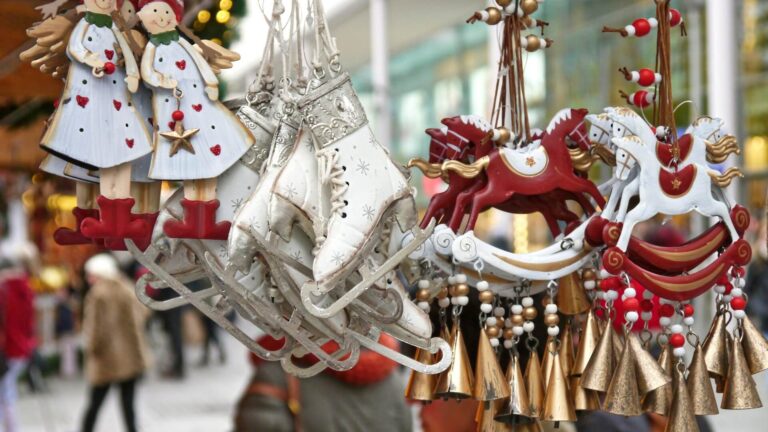
If you need a freelance travel writer or you would like to see your country, city, flight, etc., presented on the blog, drop me an email.
Find our more on Freelance Travel Writer page.
Here are things to do in Lindos, an extremely important town on this Greek island. I loved rushing around its narrow alleys among white-washed houses; climbing up to Lindos Acropolis; plunging into the turquoise sea at the very cove where, they say, Apostle Paul disembarked once; and entering the 14th-century church.
So, here are my things to do in Lindos. And I would do them again.
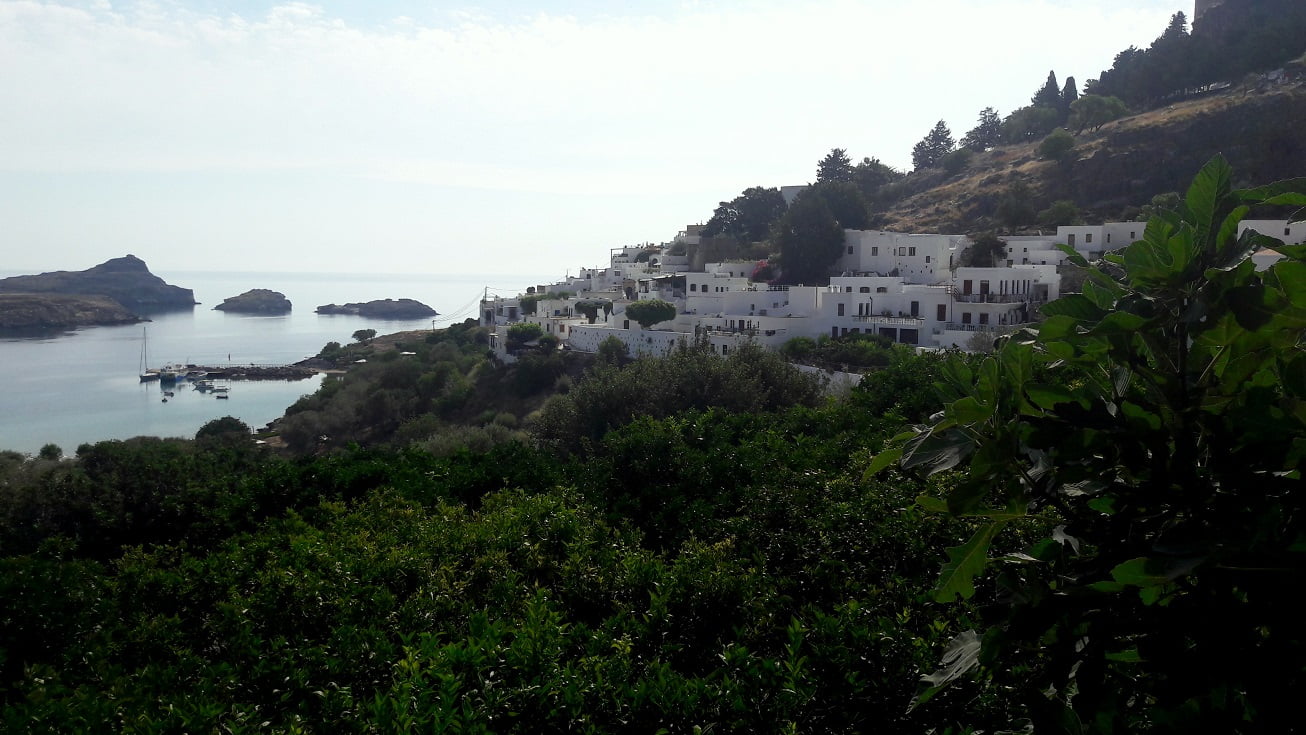
To tell you the truth, I was impatient to visit this town. I was thinking about traveling to Santorini this summer since I would love to rest my eyes upon those white-washed houses with blue rooftops overlooking the beautiful dark blue sea below… But it turned out even better – I came to Rhodes and visited another Greek settlement where this practice of wall painting in white began in the first place.
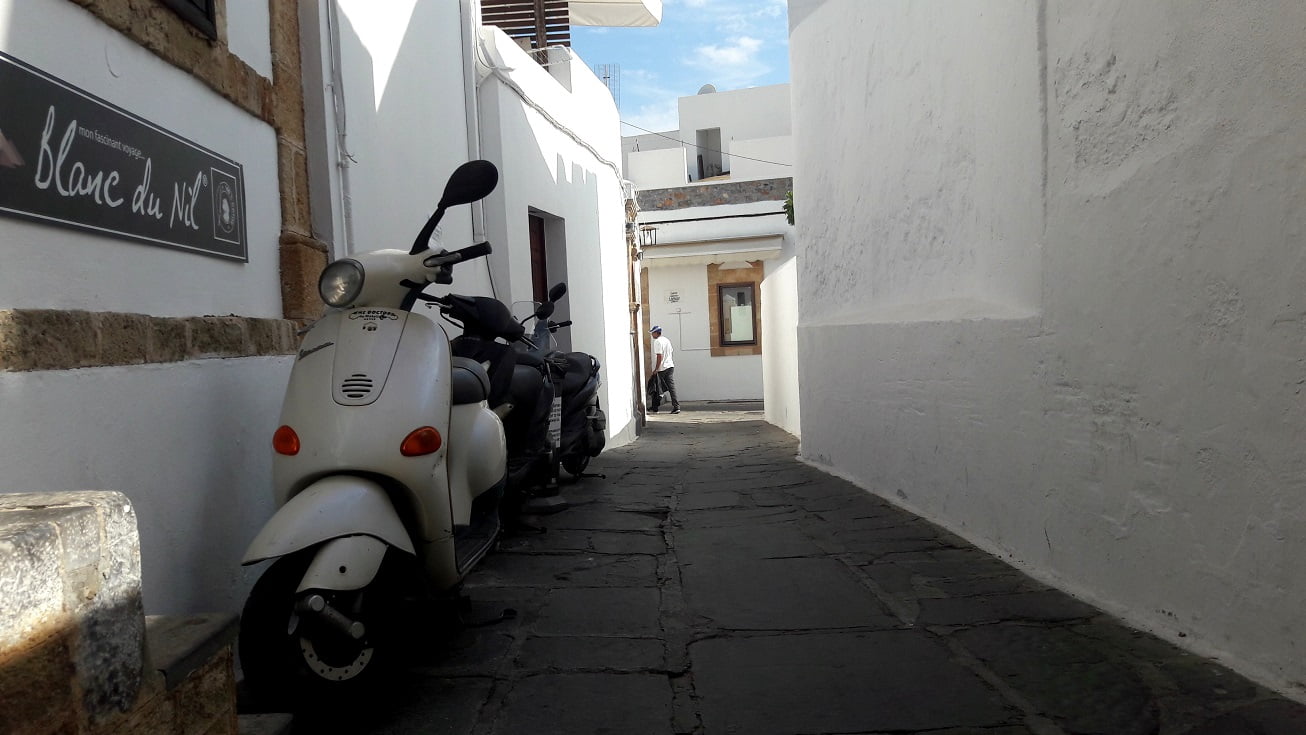
It was the Turks who introduced white lime in the 16th century. While it was practical since the lime wash allowed walls to breathe, unlike any other paint, protecting stone, brick, and wood, it didn’t soak up the sun and heat. It was also very cheap at the time. So, Lindians embraced this material and started to paint their houses in white lime. The practice was soon welcomed by other people and other islands, hence – white villages on Santorini or Mykonos for example.
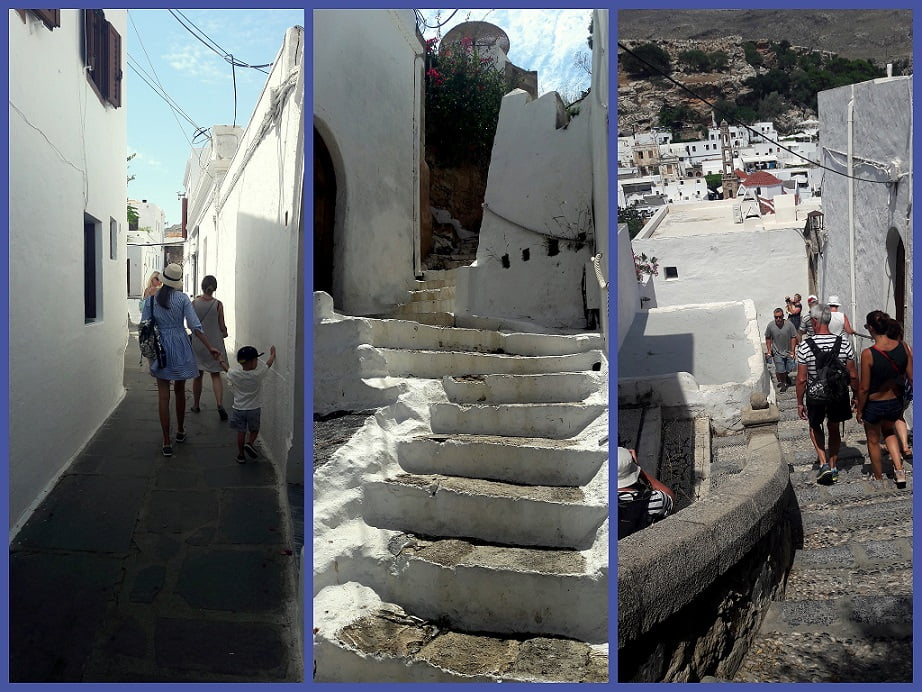
Today, we consider this a Greek tradition, especially related to islands. But it did not start as a way to make those villages more beautiful or stylish, but because of more down-to-earth reasons.
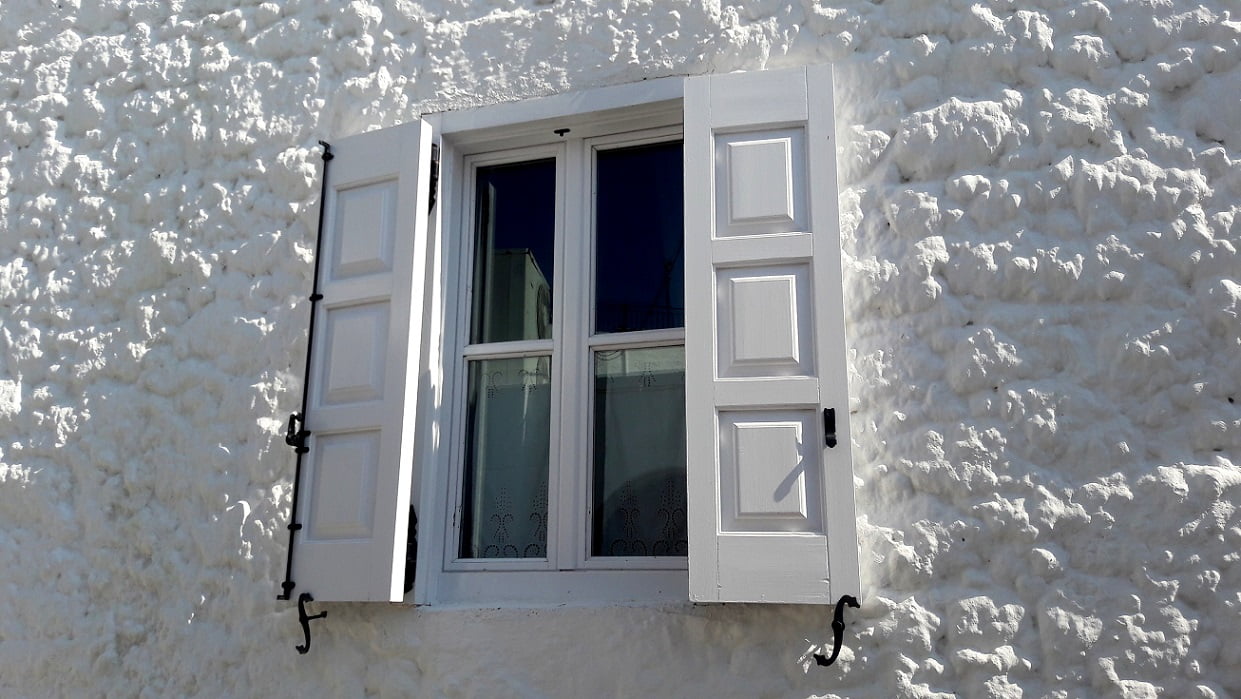
Should I mention that I was amazed by this fact? And that when people say how “Lindos is so pretty, it looks like Santorini”, it should actually be the other way around. I immediately got impatient to visit all the beautiful Greek white-washed islands. It was only natural after seeing the origin, right?
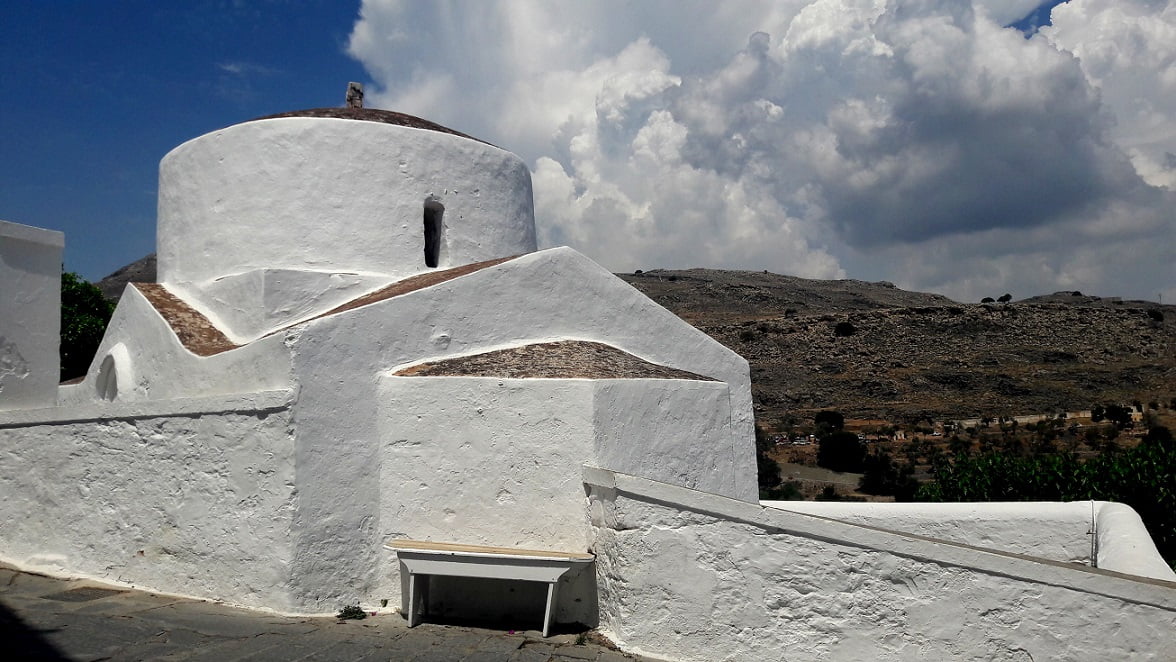
But, let’s start from the beginning. Lindos town is way more than just a stylish Greek white village. Being one of the three most important island towns (along with Ialyssos and Kameiros, remember?), that was founded by Dorians in the 12th century BC, Lindos was an important center. It was the capital and the stronghold of Rhodes. That is why things to do in Lindos should begin with a fact or two about the settlement.
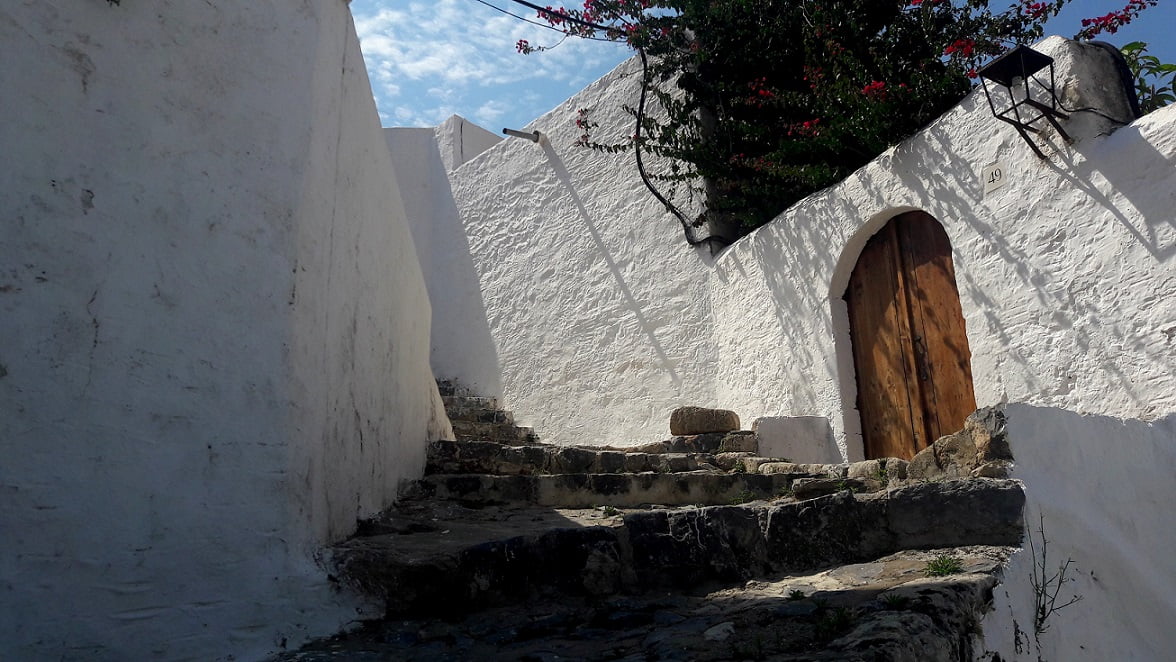
When Rhodes sent 9 ships to take part in the Trojan War (more about it in the post about Colossus of Rhodes), it is believed that they all came from Lindos. The development of the town was due to its naval power. I already mentioned that the town had colonies by the 7th century BC. It monopolized a large part of trade and shipping in the Mediterranean.
The people of Lindos were the first to draw up a naval code of justice as the Rhodian Naval Code. This was to become the basis of Roman naval justice and it would even be incorporated into the core of modern maritime law. When the town of Rhodes was built in 408 BC, a lot of inhabitants moved there from Lindos and the village started to decline, but it did preserve the practice of maritime trade.
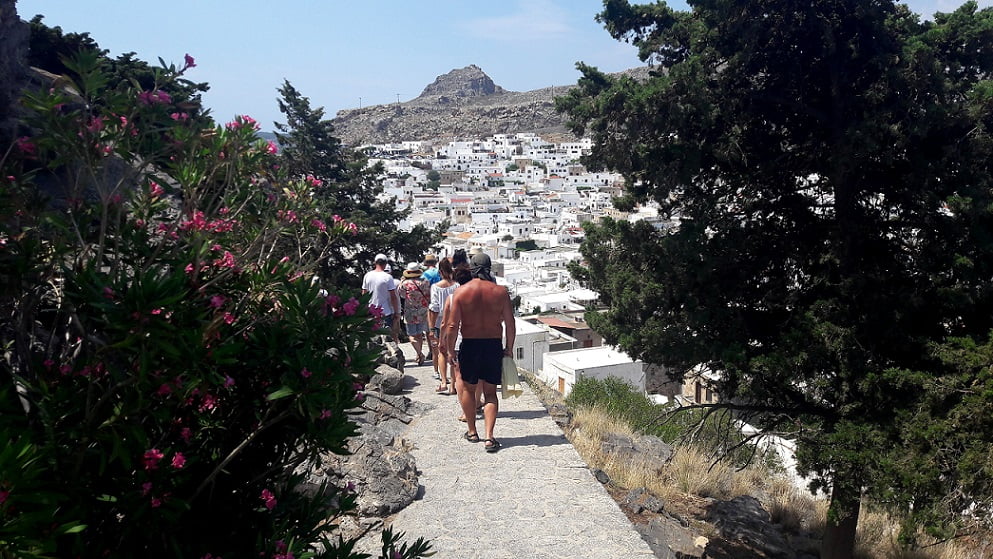
The people of Lindos were also great sculptors. Their bronze statues are famed for their incomparable craft. This is where Chares came from, the same sculptor who did the 31-meter tall statue of Colossus in Rhodes town at the end of the 3rd century BC that is now known as one of the seven wonders of the ancient world.
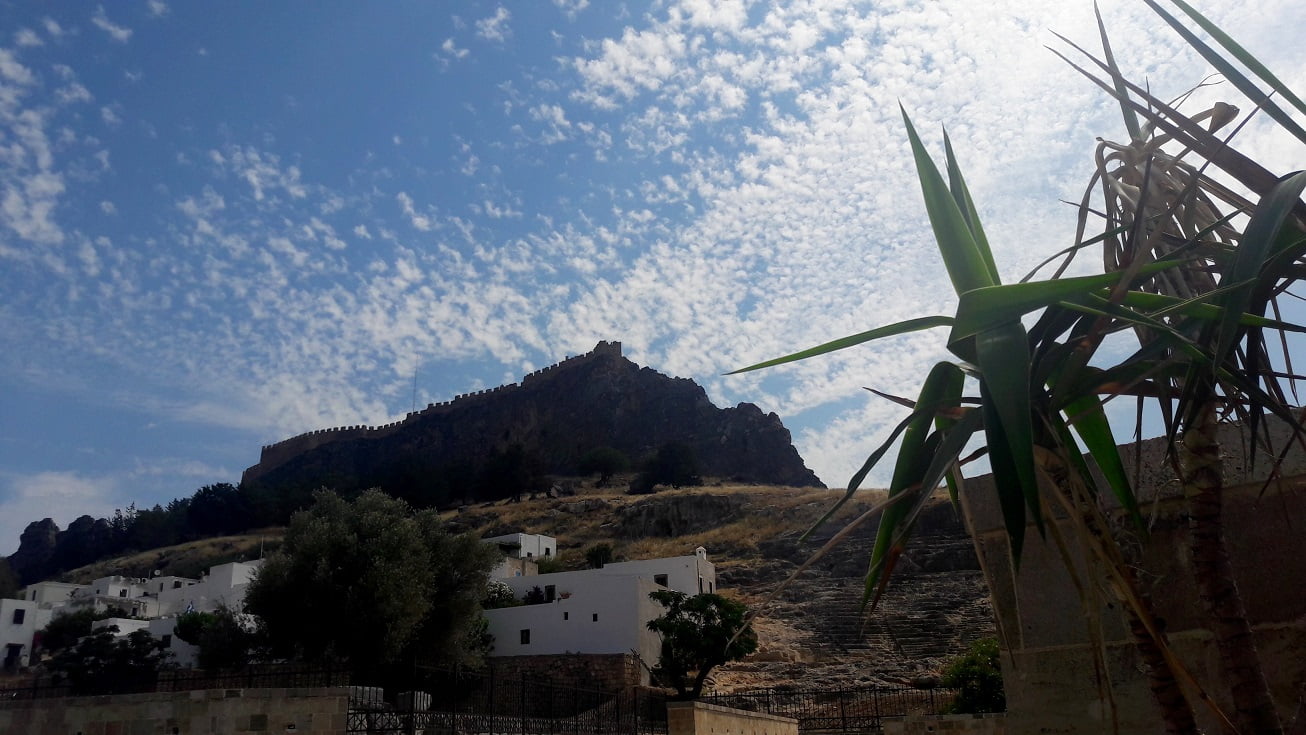
The town reached the height of its power in the 6th century BC during the reign of Cleobulos, who is regarded as one of the Seven Sages of antiquity. He was the first to support the funding of public works by fund-raising among the citizens. Money from these drives was used to build the Temple of Athena in 550 BC also known as Lindos Acropolis. (It is possible to go inside the walls of the Acropolis, built by the Knights of Rhodes around the ancient location. Even though the ancient remains were not as numerous as one would expect, the view from up there will leave you in awe.)
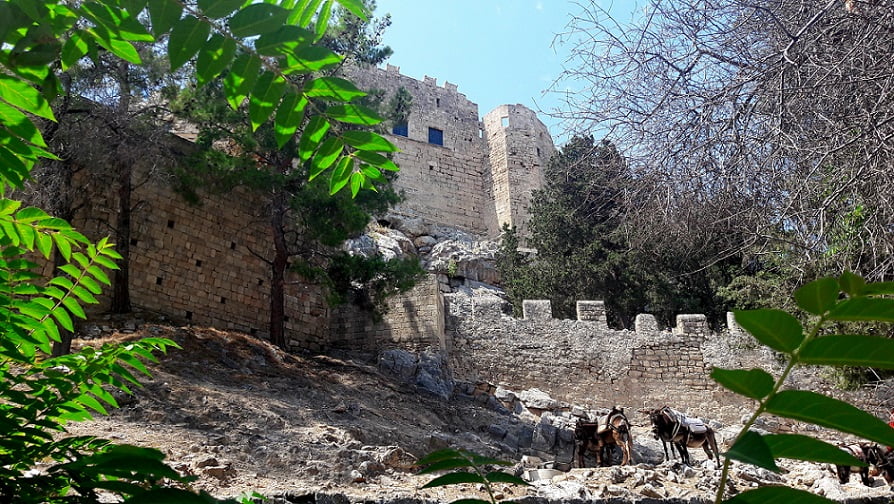
Among the most important finds in the area are two marble plaques inscribed by a priest of Athena in 99 BC. One of them is a list of visitors to the temple with names such as Herakles, Helen of Troy, Menelaus, King of Persi, and Alexander the Great. The temple was operational until the end of the 4th century AD when Theodosius II ordered the destruction of all the remnants of idolatry. The Olympic Games were also forbidden at that time and priests of Lindian Athena were sentenced to death.
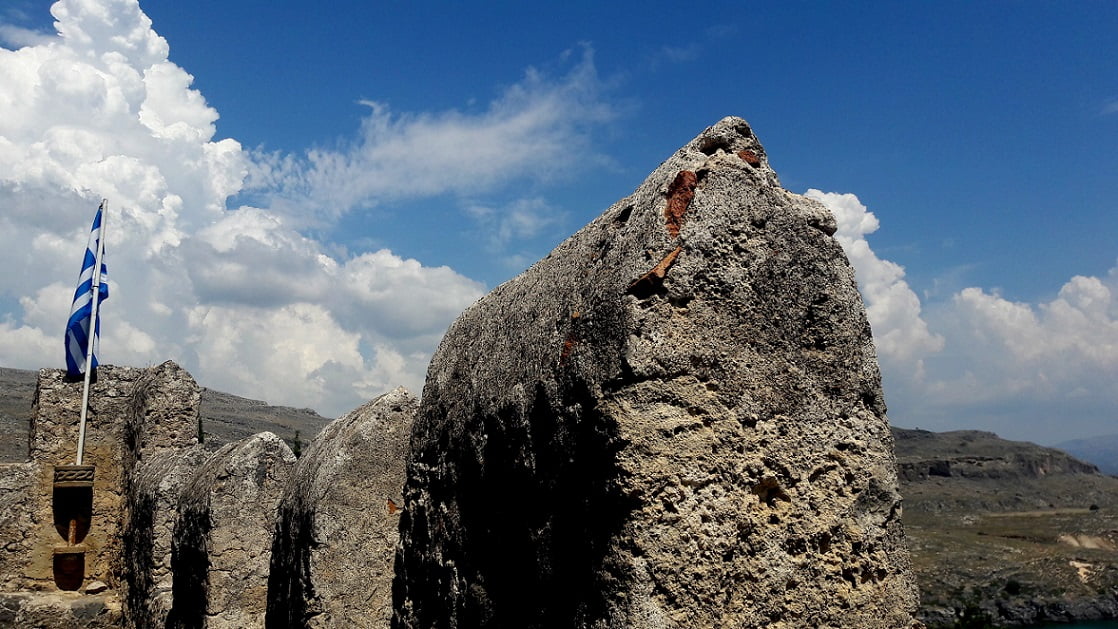
There is also an important liaison between Lindos and Christianity. According to tradition, the harbor in Lindos was named after Apostle Paul who disembarked here during his journey of preaching the message of Jesus. There is a small church dedicated to St Paul, which they say is popular among Greeks for weddings. And that cove is just gorgeous, one of the loveliest bays I have seen on the island.
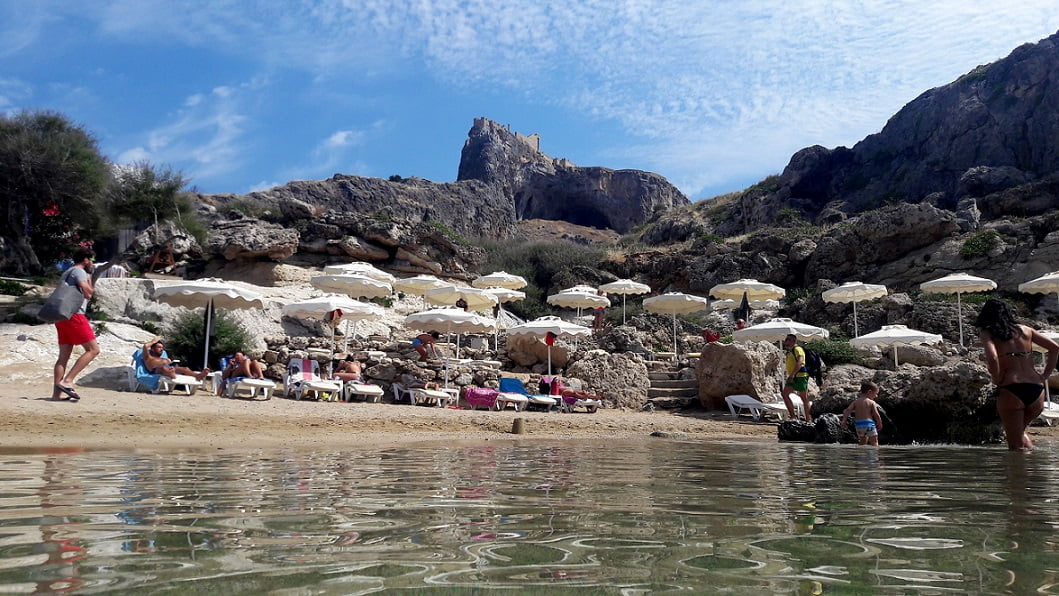
Just imagine – two small sandy beaches between rocks on both sides, sunbeds scattered over rocks, and the sea so clear and crisp that you can see its bottom. If you look up, there proudly stands the Acropolis at 166 meters. And here below, I couldn’t wait to jump in. So, naturally, this is a must-do among our things to do in Lindos.
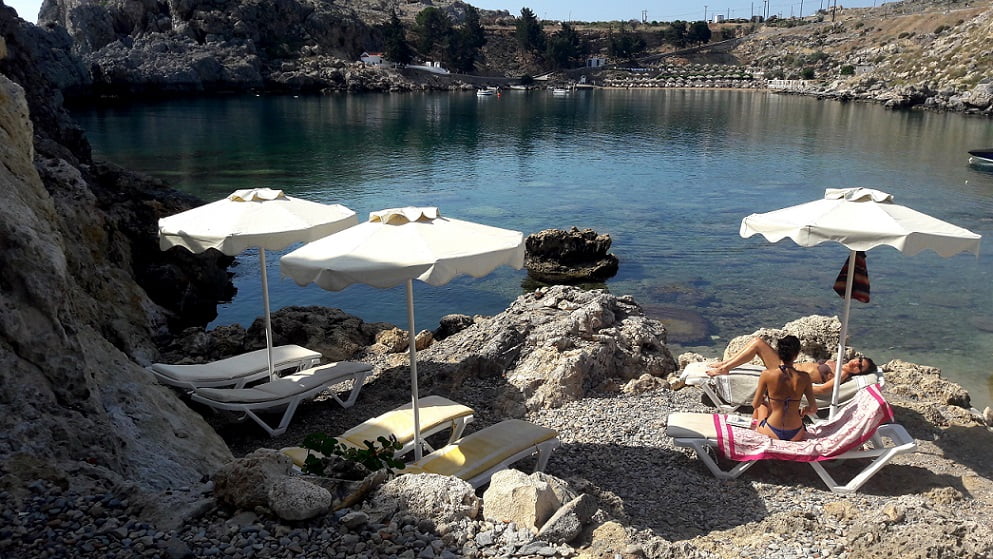
It was still early, nobody was swimming yet. They told me that it was possible to swim through and around a gorge between the rocks, and that I would come out to the cove again. Well, I did swim right there to the gorge, but it was a bit scary. I mean, if I go through, I’ll be in the open where nobody can see me from the small bay…
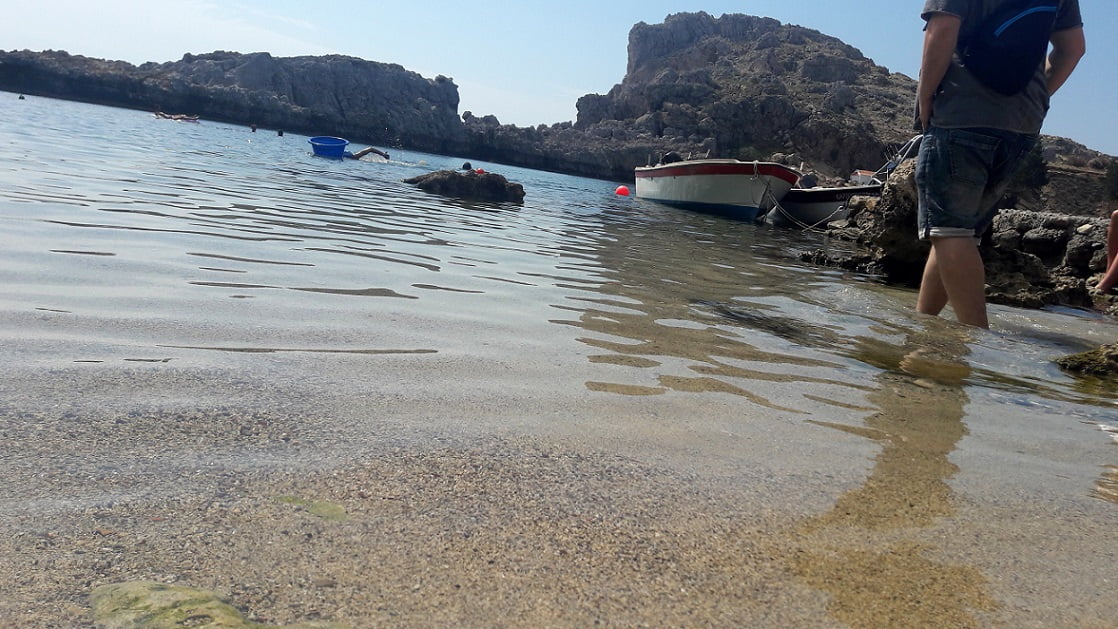
While I was thinking about whether to do it or not, a guy came out through that passage, kayaking. This was my chance. I asked him just to be there, to kindly wait until I swim around the huge rock and come out on the other end, just to make sure someone knows I’m out there. And he was so kind to do so. So I swam around which made me so proud. It still does.
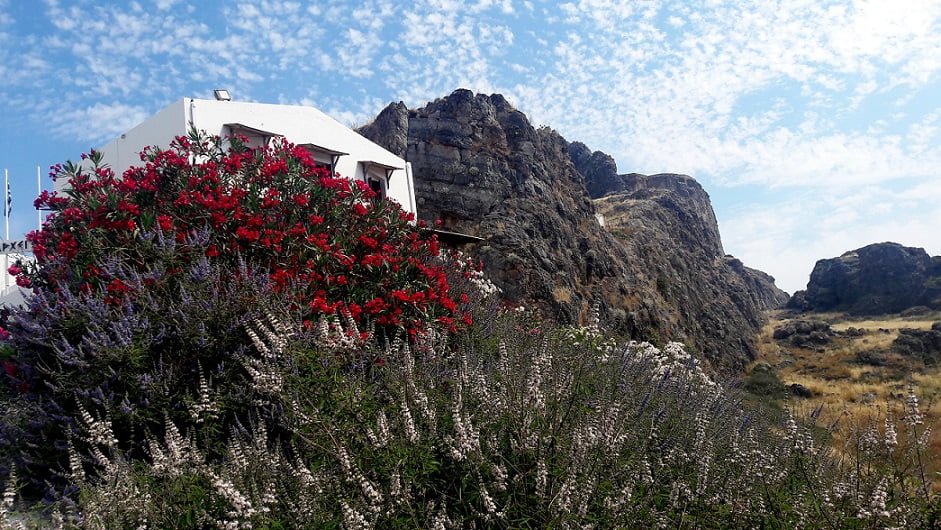
I came out of the water, rushed to gather the things I threw around, and went up again, back to see Lindos old town. I just loved those small houses. I think I took a few hundred photos. At some point, I even got lost, but the Acropolis can serve as a navigation spot since it can be seen from every part of the village.
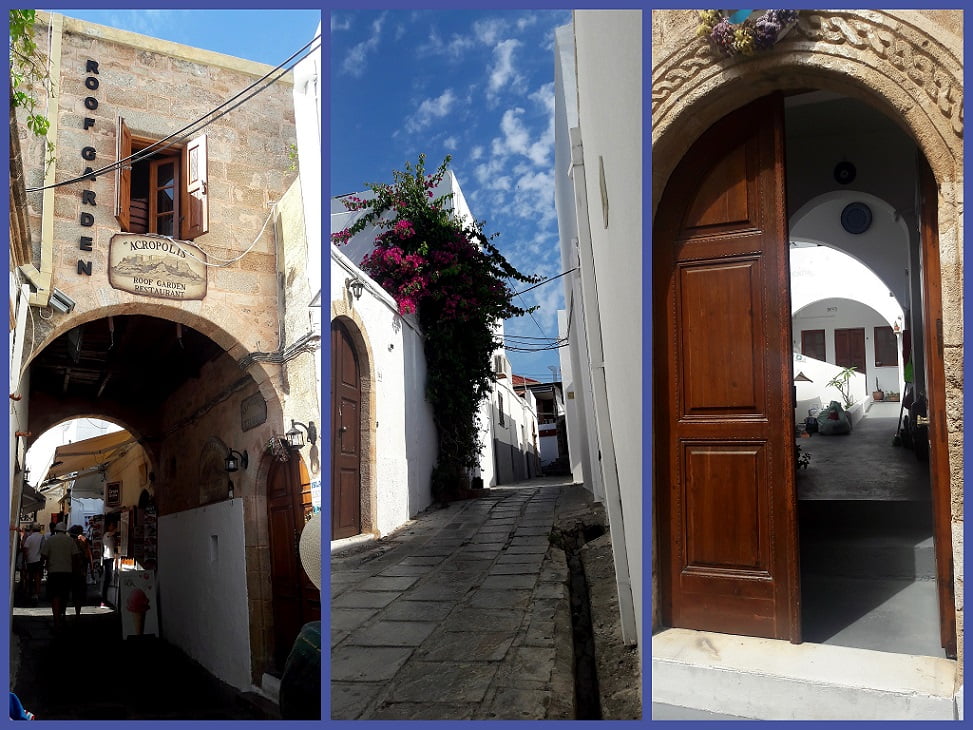
I wanted to visit the Church of Our Lady (Theotokou) which was most probably built in the 14th century on the site of an older one. The Grand Master d’Aubusson renovated it in 1489 and built the bell tower where his coat of arms can be seen. Wall paintings inside date back to 1799 while the wood carving is from the 17th century. The floor is decorated with black and white pebbles, the technique known as the chochlaki. It originated from the Hellenistic period and reached its zenith during the Byzantine era. (Different examples can be found throughout Rhodes, in the Old Town as well.)
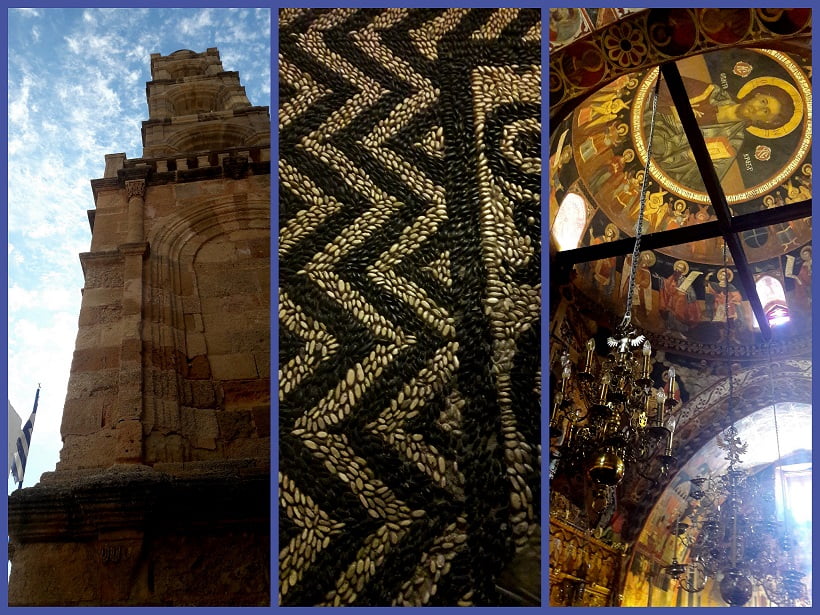
You will get appropriate clothing if you do not have one and are expected to leave a small contribution to the church. Everywhere you look inside, you will find another marvel to be fascinated by. I was amazed by the floor. A visit to the church should definitely be among your things to do in Lindos.
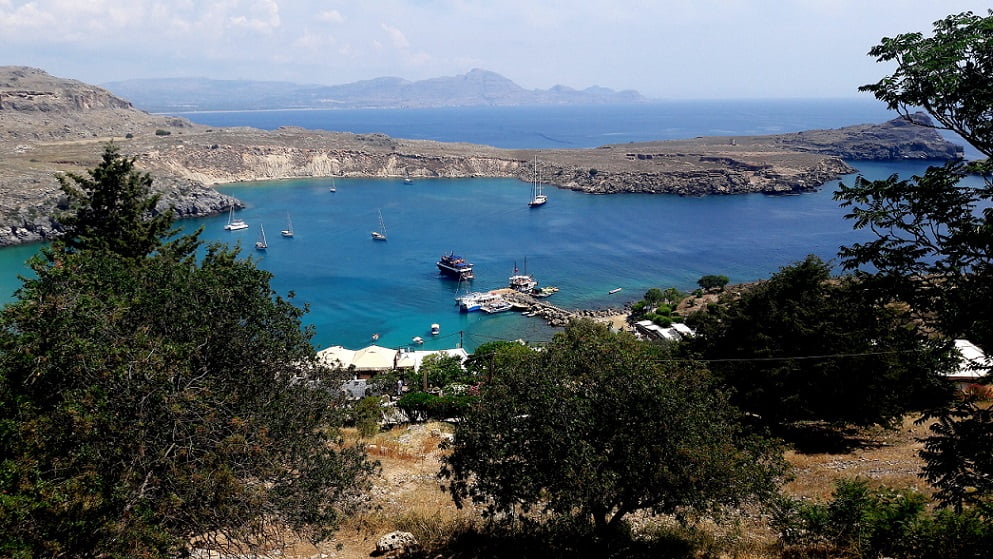
And so, I strolled around those narrow, white cobblestone alleys again, trying to get to the “official” beach (more about it in the Best Beaches in Rhodes post.). The only thing I was a bit disturbed by is the so-called “Lindos’ taxi”, lines of donkeys going up and down towards the Acropolis, carrying tourists for 6 euros…
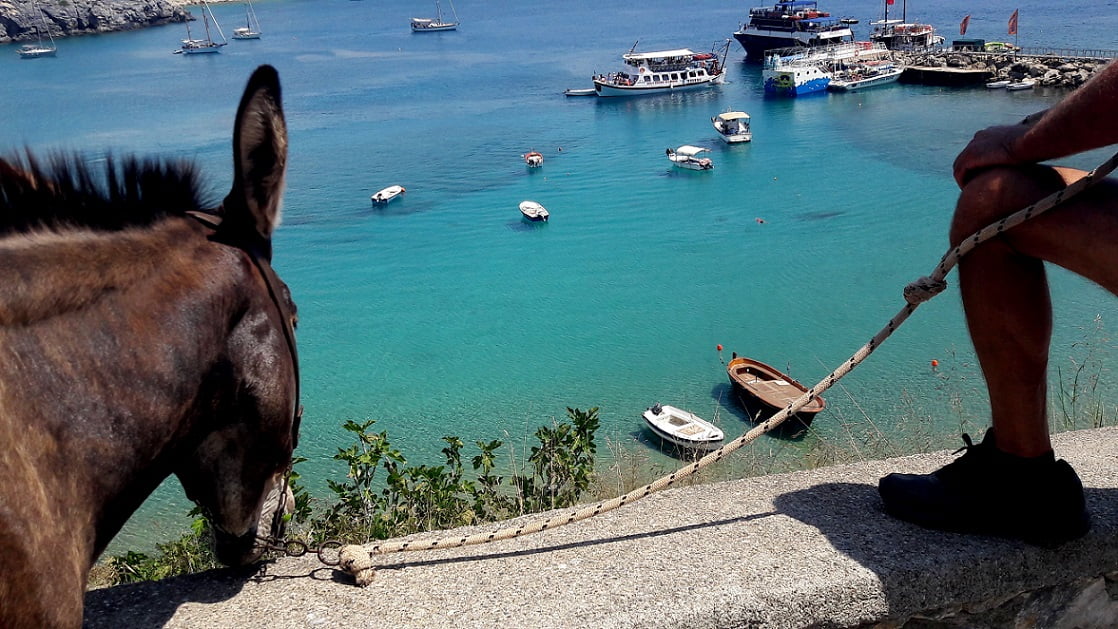
Still, the town was such a breathtaking experience!
Next: ROADTRIP TO THE EAST
The full Rhodes Greece SERIES
If you need a freelance travel writer or you would like to see your country, city, flight, etc., presented on the blog, drop me an email.
Find our more on Freelance Travel Writer page.
I am looking forward to working with you.
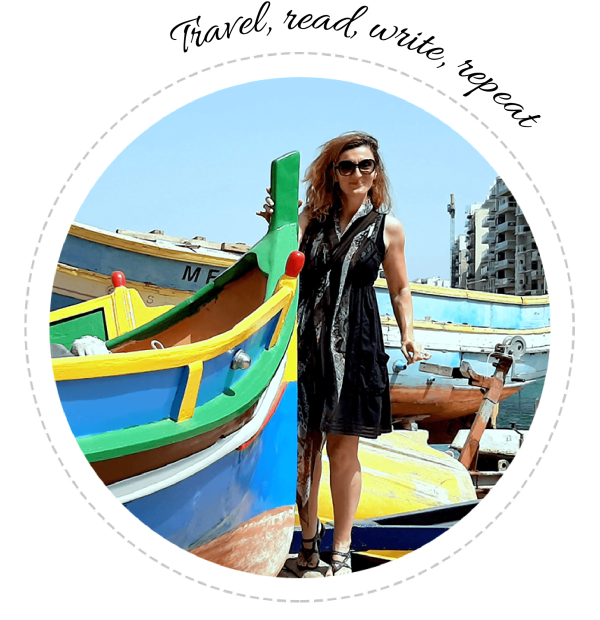



24 responses
I always thought it was Santorini! Thanks for opening my eyes!
Everybody does, since it’s the most popular island of such a practice. Such an interesting fact, isn’t it! 🙂
I always learn new things from your posts! I love Rhodes!!!
Oh, thank you so much, so nice of you to say that! 🙂
One draws an image of Santorini on seeing so many white walls. This is a nice little village and I love visiting such places. Good to read about the interesting historical facts about this place. 🙂
Yes, and well, everybody knows about Santorini, but it didn’t start there. Loved that fact, didn’t know it myself until I went to Rhodes. 🙂
Oh I had no idea that the Turks started the white wash!
They have brought the lime in, Greeks started the practice. Still, amazing little detail, right. 😉
If you asked a Turkish guy ‘just to be there’ while you are swimming, he would guard you till morning. If he knew you are Serbian, he would be around till the end of your vacation. They are so in love with the beauty of Serbian women. 😀 I mean, they love helping people 😀 😀
Heheheeh, you’ve made me laugh! 😀 Good to know both, about the help and the attitude towards us from Serbia. Thank you so much Ozlem Soydan, you’ve made my day! <3 😀 By the way, I've seen on your blog that "Ozlem Soydan" means something like "Teacher", right? I don't know your name then, that's why I'm asking. 🙂 I'm Danijela, it's been a pleasure!
I’m glad I made you smile because I enjoy reading your Glimpses so much.
Özlem is my name (which means missing, longing for) and Soydan is my surname. I am a teacher, that might be why you’ve thought so. Great pleasure to meet you too Danijela <3 🙂
I’ve hit the “translate” button on your blog and you know how weird everything gets then! 😀 Very pleased to meet you Ozlem, thank you! 🙂
Really enjoyed reading your blog post about Lindos! While almost every tourist is crazy about Santorini, it’s good to know there are places like Lindos with such an interesting history and a gorgeous style of architecture as well. Also love your photos here 🙂
There are a lot of other islands in Greece with white houses and streets (Rhodes was just the first), but we still tend to solely refer to Santorini as such. Amazing! 😀 Thank you so much, so glad you’ve enjoyed the post!
Rhodes looks like a great off the beaten path destination in Greece. I can’t believe they’re able to keep the buildings so white! They must have an official wall-washer or something 😛
It’s not really off the beaten path, it’s well known. Not popular for partying and such as Mykonos for example, but a big, genuine Greek island. 🙂
I never knew the background of painting the building in white. I always thought it was the Greek who invented this to avoid the heat and for aesthetics. Rhodes is such a beautiful place!
It was to avoid the heat, but not for aesthetics. That came late! 😀
As somebody interested in architecture and home construction, it was very interesting to ready about Lindos. Definitely should put that on my list the next time I am in Greece. Anytime I am in a town with white lime, I will think of Lindos.
Yes, it’s going to “haunt” me as well! 😀 The same here, that’s going to be the first thought.
I’ve been to Greece quite a few times but Rhodes has never made it on the list. Santorini is lovely – so sounds like its a great place to go to get more of that charm but a new place I’ve never been. Will have to check this out next time I plan a trip to Greece.
Amazing island, you’ll see. If you like Greece, you’ll definitely love the island. 🙂
Whitewashed houses and blue sea this is a typical picture of a Greek town for me ?? I would like to see more places like Lindos, so the Greek Islands are also on my list. Each of them is beautiful and unique ??
I loved Rhodes. But this year I had to postpone my trip to Cyclades islands (Paros, Naxos, Myconos, Santorini, Ios) that was booked for May, in the middle of the coronavirus situation. So, I postponed the journey for July and hope for the best. 😀
Stay tuned because I will write the first post at the end of July if everything goes well.